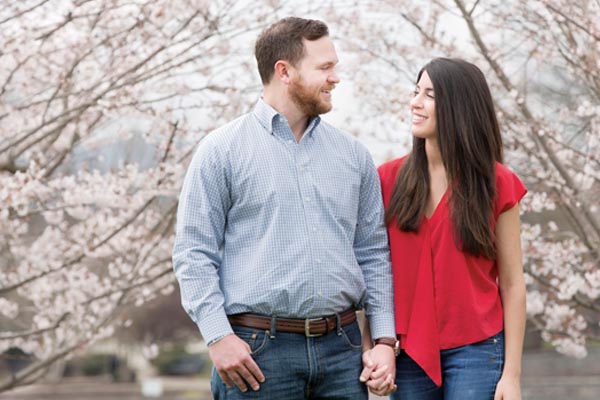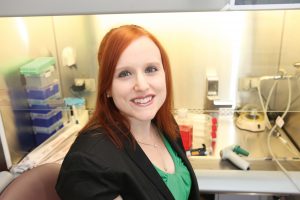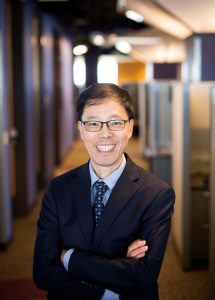We’ve Only Just Begun
Facing cancer with youthful resilience
January 3, 2019 | Jill Clendening

Centennial High School teacher Stephen Huff vividly remembers the day he came very close to passing out behind the wheel.
“It was the day after the final day of school in 2017,” Huff said. “I was on my way home from getting a chest CT scan when my phone rang. It was my doctor. I just knew that whatever it was, it wasn’t good. Because of what he’d seen on the scan, he told me, ‘I’ve already scheduled an appointment for you with an oncologist.’ I asked, ‘What’s an oncologist?’ He said, ‘That’s a physician who specializes in treating cancer.’
“I pulled the car over and said, ‘What do you mean?’
That started my discovery of cancer.”
Huff was 29 years old when he became a member of a club that no one would ever willingly join — young adults diagnosed with cancer. Recent studies have shown some troubling trends in the increasing incidence of certain types of cancer among individuals ranging in age from their early 20s to their 40s.
Huff had just completed his first year as an educator, teaching in Williamson County, Tennessee. He was in the midst of planning a wedding with his fiancee, Emily Acker, and they were excited about their road ahead. Other than an annoying, lingering cough and a small knot in his neck he’d been told was likely an inflamed lymph node from a respiratory infection, he felt just fine.
“As a young, healthy adult who had never smoked and who had always been involved in sports — and specifically having been a professional baseball player with the Chicago White Sox — I thought I was just not at risk for cancer,” he said. “When I was diagnosed, it was a complete shock to my system. I found out pretty quickly that cancer can affect anyone. It doesn’t discriminate. It doesn’t pick people based on their gender, age, skin color or anything like that.”
Following a lung biopsy, Huff was diagnosed with stage IV, non-small cell lung cancer (NSCLC). His family encouraged him to have a genomic test to identify the specific mutation of his tumor before he committed to any treatment. He came to Vanderbilt-Ingram Cancer Center (VICC) for his care, where he met his oncologist, Leora Horn, MD, MSc, Ingram Associate Professor of Cancer Research at VICC and associate professor of Medicine in the Division of Hematology/Oncology.
Huff’s tumor cells were defined as being ALK positive (anaplastic lymphoma kinase positive, or ALK+) lung cancer, a type that occurs in one out of 25 non-small cell lung cancer patients. Younger patients — usually age 55 and under — who have never smoked are most likely to be diagnosed as being ALK positive. Because he had this specific mutation, Huff qualified for targeted therapy. For him, that meant taking four pills, twice a day, for the rest of his life.
“Dr. Horn said, ‘It has minimal side effects compared to chemo, and some of your symptoms are going to be gone within a day.’ She was right.”
Targeted therapy works by targeting specific genes or proteins to help stop cancer from growing and continuing to spread. These genes and proteins are found in cancer cells or in cells related to cancer growth, like blood vessel cells. While targeted therapy is not a cure, it can mean patients receiving this treatment for specific types of cancer can resume their regular activities of living.
“We know about 20 percent of non-small cell lung cancer patients will have a DNA abnormality that makes them a candidate for oral targeted therapy rather than IV therapy,” Horn said. “There have been studies that have compared chemotherapy to targeted therapy in patients with stage IV disease and have shown that chemotherapy has a lower response rate (less tumor shrinkage), more side effects and doesn’t work for as long, and patients’ quality of life is not as good compared to targeted therapy. The targeted therapy also works faster, with many patients experiencing a benefit within 72 hours of starting therapy.”
Horn clarified that if there comes a point in the future where the targeted therapy Huff takes becomes less effective, a re-biopsy would be done to determine his eligibility for other oral therapy.

Christine Lovly, MD, PhD, below, is partnering with Leora Horn, MD, MSc, on a Phase I trial which is showing promising results. Photo by Susan Urmy.
Christine Lovly, MD, PhD, is a world-renowned expert in ALK positive NSCLC, and her research lab focuses on mechanisms of resistance to therapy, Horn said. “Partnering with her lab, we have taken an oral agent called ensartinib from pre-clinical models to a Phase I trial where we have seen very promising results. There is also an ongoing global Phase III trial comparing this drug to crizotinib, another oral ALK inhibitor in patients with stage IV disease.”
According to the American Cancer Society, most people diagnosed with lung cancer are 65 or older, and the average age at the time of diagnosis is about 70. Researchers from the American Cancer Society and the National Cancer Institute have reported that rates of lung cancer are now higher in women than men among non-Hispanic whites and Hispanic people born since 1965, and differences in smoking patterns do not fully account for the change. The study was published May 23, 2018, in the New England Journal of Medicine.
Other cancers are also displaying unexpected changes in occurrence, with significantly increased rates in younger adults.
In February 2017, a study in the Journal of Investigative Medicine reported that colon cancer is rising among younger adults, and death rates among adults ages 20-54 had increased slightly, from 3.9 deaths per 100,000 people in 2004 to 4.3 deaths per 100,000 in 2014, while the death rate from colon cancer has declined in older populations. The increase in deaths was reported primarily among Caucasians.
In August 2018, a study led by the American Cancer Society and published in the Journal of the National Cancer Institute reported that individuals born in 1990 have double the risk of colon cancer and quadruple the risk of rectal cancer compared to people born around 1950, when colorectal cancer risk was lowest. The study found that colorectal cancer incidence rates are rising in young and middle-aged adults, including people in their early 50s, with rectal cancer rates increasing particularly fast. As a result, three in 10 rectal cancer diagnoses are now in patients younger than age 55.
There’s also an increase in melanoma in young adults, which has been documented in several major studies in top medical journals. In March 2016, a study published in JAMA Dermatology examined the association between the exposure to ultraviolet radiation from indoor tanning and the increased incidence of melanoma among men and women younger than 50. The study reported that while people of any sex who use indoor tanning have an increased incidence of melanoma, beginning in 2006 the incidence was higher in women younger than 50 than in men. The increase had elevated sharply for women in this age group.
And although most breast cancers are found in women who are 50 years old or older, nearly 11 percent of all new cases of breast cancer in the United States are found in women younger than 45 years of age, according to current statistics from the Centers for Disease Control and Prevention (CDC). Known risk factors that lead to the development of breast cancer at a younger age are typically genetic, magnifying the need for women to be aware of their genetic disposition for this type of cancer.
Now that these upticks in cancer incidence among younger adults have been spotted, it is epidemiologists’ job to paint a clearer picture of what exactly is going on. Epidemiologists around the world such as Wei Zheng, MD, PhD, director of the Vanderbilt Epidemiology Center, are at work behind the scenes, analyzing disease trends and patterns, often working with biostatisticians who create mathematical models to better expose correlations between diseases and their causes.
Zheng has a message for younger adults who might be feeling anxiety with each new headline about increasing numbers of cancers reaching into younger demographics.
“I would say be aware, but young people should not be panicked because the incidence rates for cancer for their age group are still relatively low overall,” said Zheng, the Anne Potter Wilson Professor of Medicine. “When we do see an increase in the incidence of cancer, we always ask a couple of questions. First, whether the increase in disease is really just an artifact, which is error in the perception or representation of information. For example, a higher number of new cancer cases could actually be the result of more people getting more screenings, and so there are more diagnoses and even over-diagnoses.
“The second question is whether there is any new exposure — whether there is a new carcinogen that has been introduced to the environment or an increased exposure of certain known carcinogens. If so, then these individuals might be getting more exposure, which increases their risk of developing cancer.
“If the reason for the increase in the incidence of cancer is because of increased exposure, that tells us we need to do a lot of education and primary prevention. When I say primary prevention, that means asking people to avoid some of the exposure — to really encourage people to do those things that we already know are correlated to cancer risk, like reducing obesity, improving their diet, not smoking, using sunscreen and limiting tanning bed use.”
One thing medical professionals can definitely do better is make their patients more aware of the risk factors for cancer and how to avoid them, Zheng said.

Wei Zheng, MD, PhD, analyzes disease trends and patterns, looking for correlations between diseases and their causes. Photo by Susan Urmy.
“We as an industry and as an academic research center don’t always do a good enough job of taking this knowledge from a journal publication that most people will never see and getting it to that 15-year-old girl who thinks it’s cool to be tan,” he said. “We need to do a more effective job of getting our message to the public so we have a more significant impact on society. Also, doctors need to be aware of this increase and offer appropriate exams so cancers can be identified at their early stages.”
As for Huff, while he won’t go quite so far as to say being hit with the diagnosis of lung cancer at age 29 has been a blessing, he has embraced this challenge as an advocacy platform to raise funds for research and to educate others about the disease. And he thinks the fact that he has youthful resilience and optimism to draw upon is a definite bonus.
“I honestly think what has propelled me into advocating for the disease is that I have been given an opportunity that not many people have by taking this drug, so I need to make use of this opportunity,” Huff said. “I need to serve, and I need to do what I can to get my message out there and help others.”
He and his wife, Emily, have established a nonprofit called The Huff Project (www.thehuffproject.com), which has several ongoing initiatives, most notably a drive to establish a new Tennessee specialty license plate for lung cancer awareness — the sale of which will benefit lung cancer research. He also worked with an impressive roster of Nashville’s top singer-songwriters to put together a benefit showcase at The Factory in Franklin in October 2018, with all proceeds benefiting lung cancer research.
And then there are his students.
“I’ve had students approach me and say, ‘Mr. Huff, I hear you’re sick,’” he said. “That opens the door for us to talk about it. What I like to reiterate to them is that I’m not sick, per se, but that my body is fighting a disease right now. I hope that they can see me as someone who perseveres through tough times, and maybe it can help them, too. Maybe they’ll think, ‘I don’t feel so great today, but I’m still going to school because Mr. Huff’s going to be there. If he’s there, I’m there.’”
